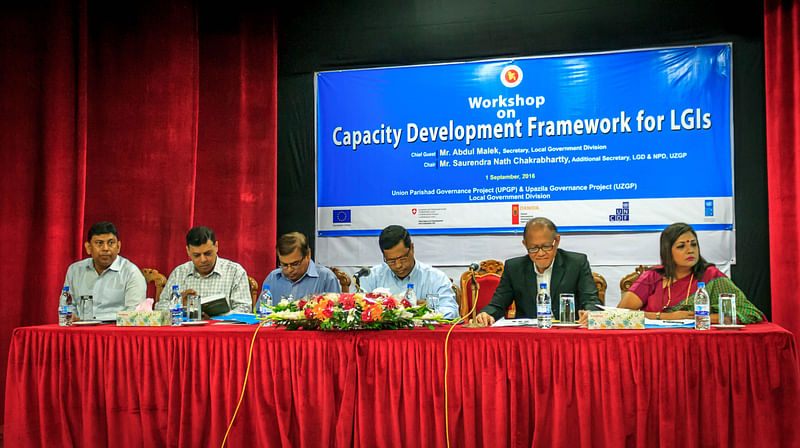Capacity building framework for LGIs stressed

A day-long workshop on “Draft capacity development framework for Local Government Institutions (LGI)” was held in Dhaka on Thursday.
The Union Parishad Governance Project (UPGP) and Upazila Governance Project (UZGP) under Local Government Division (LGD) jointly organised the workshop in Department of Public Health Engineering (DPHE) auditorium, said a press release.
The workshop was aimed at sharing the draft framework and solicit opinions from development partners, different ministries and departments, people’s representatives from different tiers of LGIs, academicians, civil society organisations (CSOs) and non-government organisations (NGOs) in order to enrich and finalise the draft.
LGD secretary Abdul Malek was present at the inaugural session as chief guest while UNDP Bangladesh assistant country director Shaila Khan as special guest.
LGD additional secretary Saurendra Nath Chakrabhartty, also UZGP’s National Project Director, presided over the session.
Implemented by the LGD, the European Union (EU), Swiss Agency for Development Cooperation (SDC), DANIDA, UNDP and UNCDF are providing technical and financial assistance to the projects.
The main objective of developing the capacity development framework of local government institutions is to identify the capacity development needs of all types of local governments in Bangladesh, and contribute to addressing these needs by implementing an appropriate development framework.
The city corporations, municipalities, district councils, upazila councils and union councils would be brought under the framework. However, separate modules could be developed to address the capacity needs of different tiers of local government.
Professor Dr. John Vong of Lee Kuan Yew School of Public Policy, Singapore, who is also leading a three-member consultancy team to draft the capacity development framework, made a presentation on the draft.
Identifying risks and challenges the LGIs are facing now, he recommended setting up of a LGI Steering Committee to expedite proposed five capacity development interventions for LGIs including budgetary reform and financial accountability and transparency, performance evaluation and review, local government reform and leadership administration and management programme, digitalisation of LGD and gender empowerment.
Speaking on the occasion, the LGD secretary said that developing a capacity building framework for the LGIs is crucial for effective and updated capacity development for 70,000 local level actors who are intertwined with the country’s development.